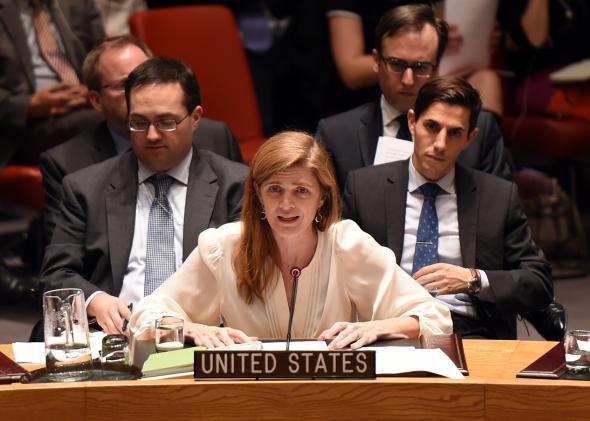Back in October, when U.S. officials were literally talking “shit” about Israeli Prime Minister Benjamin Netanyahu in off-the-record quotes, there was much speculation about the future of Israel’s crucial relationship with the United States. “There is a crisis with the U.S. and we should treat it as a crisis,” fretted then-Finance Minister Yair Lapid, who has since been booted from Netanyahu’s Cabinet.
But for now, regardless of what is said behind closed doors, U.S. officials still have Israel’s back in public. On Tuesday, Palestinians submitted a draft resolution to the U.N. Security Council that would have set a tight deadline for the establishment of an independent Palestinian state. It was defeated, receiving support from only eight out of 15 members.
U.S. Ambassador Samantha Power, whose past criticisms of Israel were a source of controversy during her confirmation hearings last year, cast the U.S. vote against what she called a “deeply imbalanced” resolution. Secretary of State John Kerry, an extremely unpopular figure in Tel Aviv whose attempted intervention in last summer’s conflict in Gaza was described by a senior Israeli official as a “strategic terror attack,” worked the phones, reportedly convincing Nigerian President Goodluck Jonathan at the last minute to switch from supporting the resolution to abstaining, denying it the nine votes needed for passage.
This isn’t the first time the U.S. has gone out on a limb at the U.N. for Israel. In 2011 the U.S. cut off funding to the cultural body UNESCO after it admitted Palestine as a member. In 2012, 138 nations in the U.N. General Assembly voted to accord Palestine “non-member observer state” status, with just Israel, the U.S. and seven other countries voting against.
Tuesday’s vote total didn’t actually matter—as a permanent member of the council, the U.S. holds veto power—but getting nine votes would have been a symbolic victory for the Palestinian Authority, which in the absence of progress in negotiations, has been pursuing a strategy of confronting Israel in international organizations and seeking unilateral recognition from foreign governments. Following the vote, Palestinian President Mahmoud Abbas today signed the Rome Statute, making the Palestinians members of the International Criminal Court, where they plan to charge Israel with war crimes. Israel, which is not a signatory to the statute, is extremely unlikely to cooperate with prosecutions launched in the court, and the ICC doesn’t try people in absentia. And the move could very well backfire for the Palestinians as Palestinian officials could also face charges over attacks on Israeli civilians. Compared with the ongoing push for U.N. membership, which seems to only have upsides for the Palestinians at this point, joining the ICC is a risk.
This latest Security Council vote was hardly an unambiguous victory for Israel. The U.S. and Australia were the only countries to vote against the resolution. (Australia abstained on the 2012 Assembly vote, but has been more vocally pro-Israel since the election of Prime Minister Tony Abbott last year.) Three of the five permanent members—Russia, China, and France—voted for it. Britain, whose parliament passed a non-binding resolution in support of Palestinian statehood in October, abstained. None of the four EU countries on the council supported Israel’s position (Luxembourg voted for the resolution, and Lithuania abstained), reflecting growing impatience in Europe with Netanyahu’s government.
In addition to the U.S. and Australia, Netanyahu expressed his appreciation to the governments of Nigeria and Rwanda, which had promised to abstain. “They stood by their words, and this is what tipped the scales,” he said. As Israel’s YNet reports, this will be seen as a vindication of a major diplomatic push by Foreign Minister Avigdor Lieberman to improve Israel’s ties with African governments. But all the same, this was a close one. It was unclear how Nigeria would vote until the last day. Going forward, if the composition of the council is slightly different or the U.S. is slightly less enthusiastic about lobbying on Israel’s behalf, things could easily go very differently and Israel and its primary backer could find themselves even more isolated. Its hardly the optimal course of action for Palestinian statehood, but it’s not as if there are many better options at the moment.
